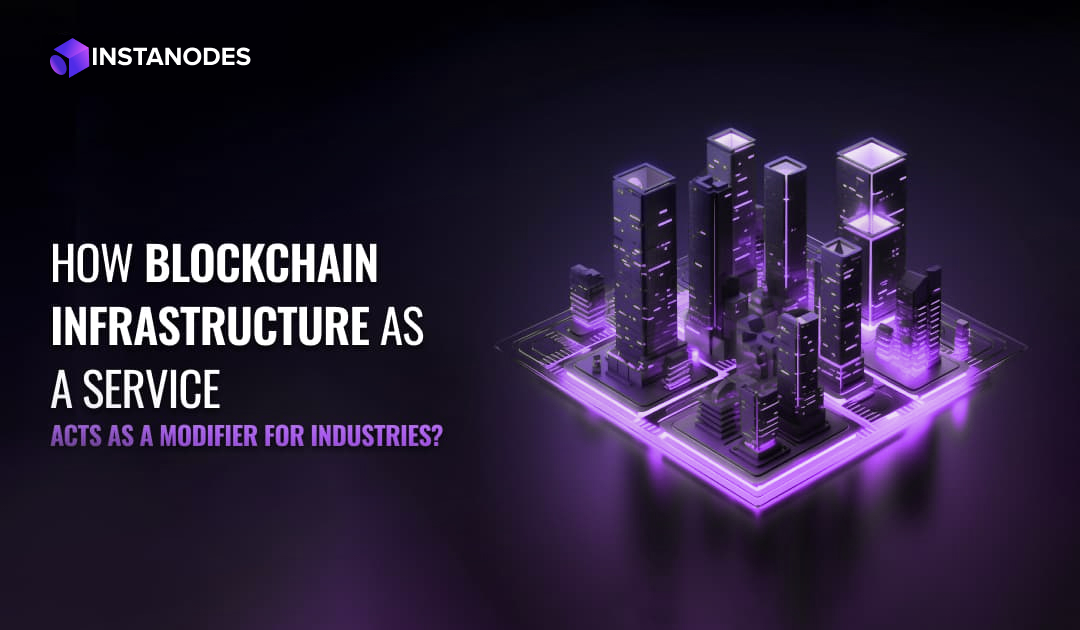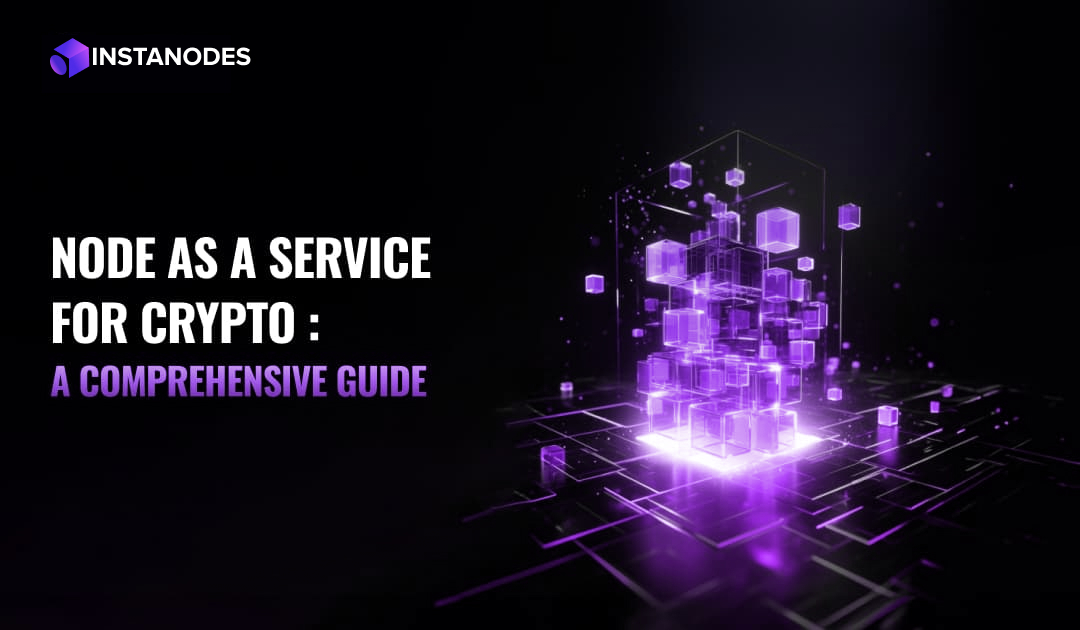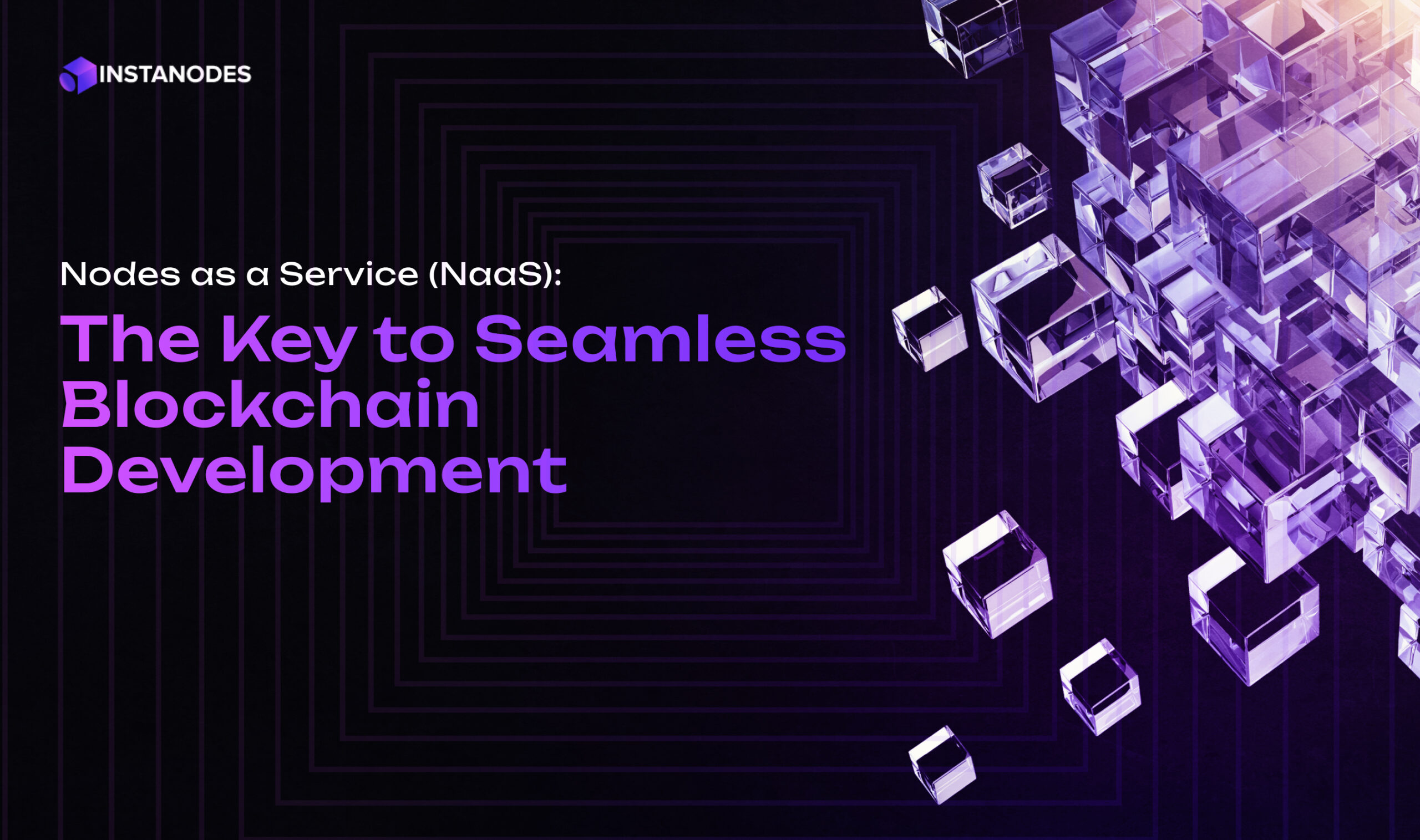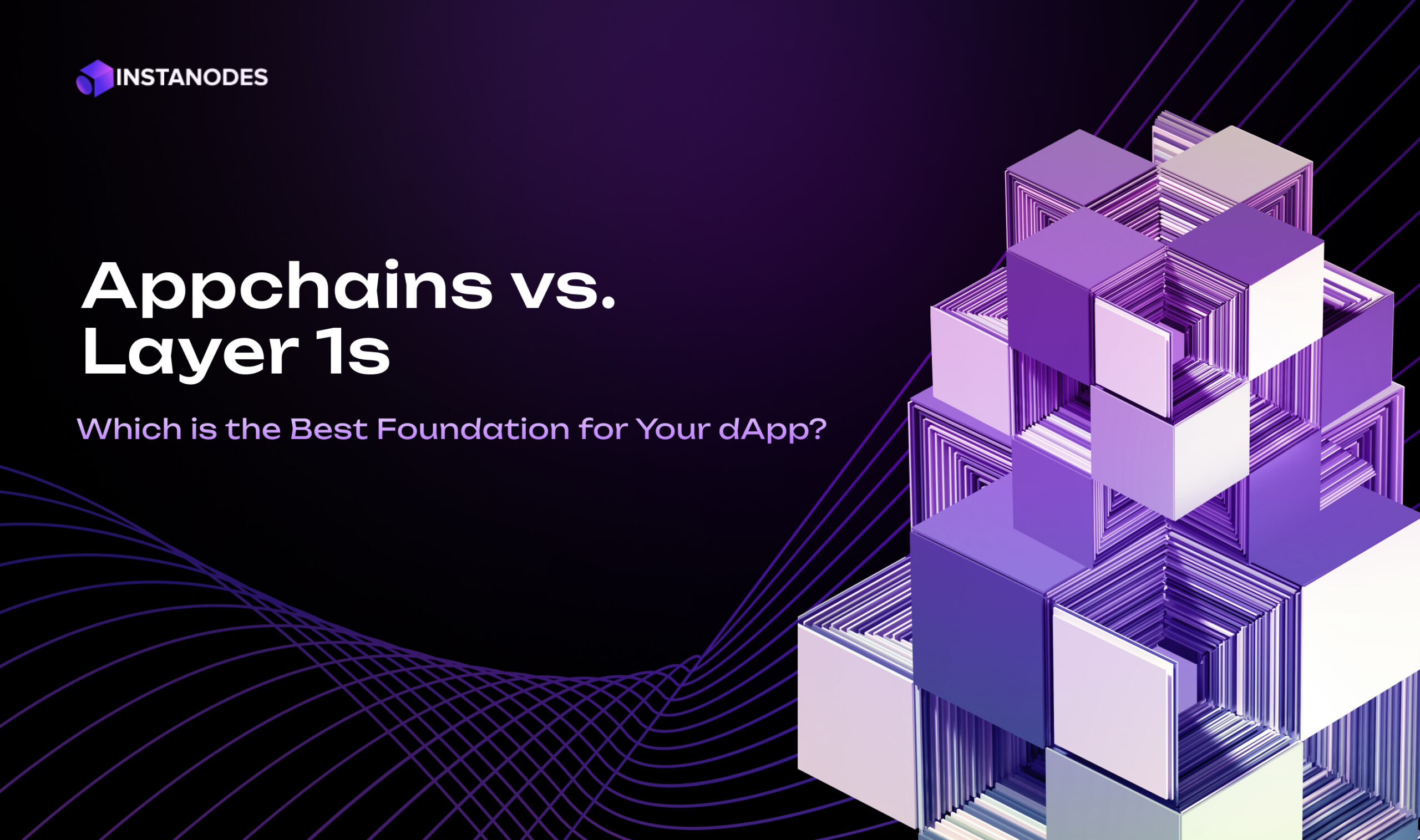Have you ever realized that there is an invisible network of computers that work uninterrupted behind every cryptocurrency transaction you’ve made and every smart contract that’s ever executed? So, what are crypto nodes? In simple words, these are the computers that are the unsung heroes of the blockchain universe, confirming transactions, ensuring network security, and keeping the whole decentralized system running.
You simply cannot ignore the role of crypto nodes while building a blockchain application that interacts with cryptocurrencies. However, setting up a node that never sleeps and maintaining its security is a challenging crusade. It’s necessary for accessing blockchain data and functionality, yet dealing with node deployment can become a technical headache that siphons resources from your primary goals.
The good news is that the terrain has changed radically. While establishing and running your own blockchain nodes was a requirement to be taken seriously about blockchain development just a few years ago, groundbreaking Node as a Service crypto solutions are now revolutionizing the game altogether.
This guide will take you through all there is to know about the importance of nodes and the role of crypto Node as a Service in making blockchain access more convenient and sound than ever before.
What Are Crypto Nodes?
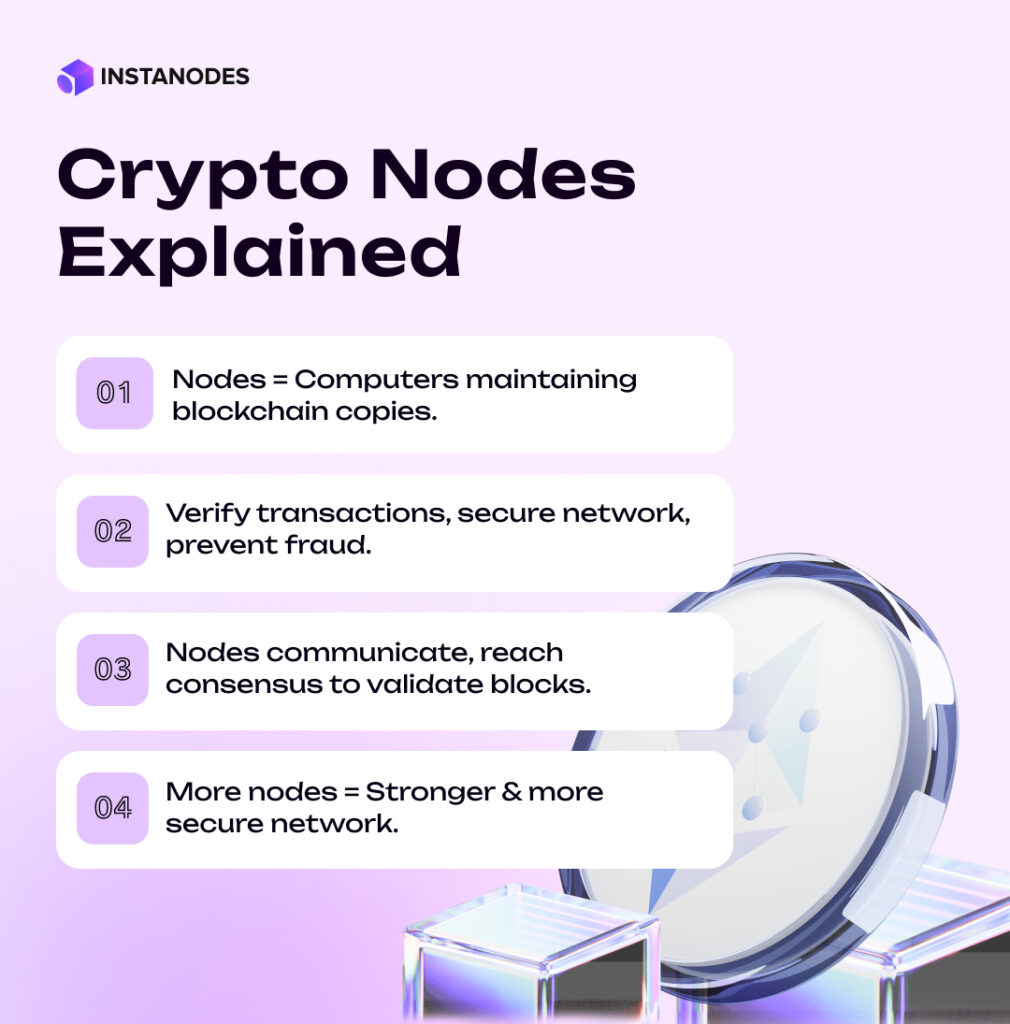
Nodes are stand-alone computers or servers connected to a blockchain network by having a copy of the distributed ledger and adhering to the rules of the network’s consensus. Consider nodes to be the underlying infrastructure of any blockchain network – they are the individual entities that, when combined, ensure the network’s integrity, security, and functionality.
How do nodes work? Every node holds a complete or partial record of the blockchain’s transaction history and talks to other nodes in order to check new transactions and blocks. When somebody sends cryptocurrency or accesses a smart contract, crypto nodes in the network cooperate to ensure that the transaction is valid, the sender has enough money, and modify the blockchain accordingly.
Nodes have a number of essential roles to play in blockchain networks. They act as authenticators, verifying that new transactions follow the rules of the network and have not been altered. They operate as data stores, maintaining records of past transactions that can be accessed by applications and users. They act as network communicators, relaying new transactions and blocks to other nodes while receiving messages from peers throughout the network.
The decentralized architecture of blockchain networks is such that no single point controls the whole system. Rather, thousands of nodes scattered worldwide collaborate to provide consistency. This scattering is what provides blockchain networks with resilience, censorship resistance, and trustlessness. When a node is offline or corrupted, the network runs uninterrupted by the redundancy offered by other nodes.
Various blockchain networks require different node specifications and requirements. To be specific, Bitcoin nodes presently hold well more than 400 GB of transaction history and must use specific software to be a part of the network. Ethereum nodes also differ in their requirements and capabilities, especially with the move to Ethereum 2.0’s proof-of-stake consensus algorithm. Other chains, such as Binance Smart Chain, Polygon, or Solana, all have their own distinct node specifications and operational needs.
Scale Your Blockchain App With Managed Nodes
Launch your blockchain app faster with managed nodes, without worrying about uptime or performance issues.
The Importance of Nodes in Cryptocurrency: Why Every Transaction Depends on Them
Crypto nodes are the backbone of cryptocurrency networks, playing multiple critical roles that ensure the system functions reliably and securely. Without nodes, blockchain networks would cease to exist, making their importance impossible to overstate.
Network Security Functions
- Independent Transaction Verification: Each node independently verifies transactions and blocks, making network manipulation extremely difficult for malicious actors.
- Majority Attack Prevention: Attackers would need to control a majority of nodes to compromise the blockchain, which becomes increasingly difficult as networks grow.
- Distributed Validation Model: Creates a security system far more robust than traditional centralized databases through distributed consensus.
Decentralization Benefits
- Elimination of Single Points of Failure: Blockchain distribution across thousands of nodes worldwide prevents network-wide outages. In today’s world, the Node as a Service crypto solution providers make it even easier to maintain a decentralized network.
- Continuous Operation: Networks continue functioning seamlessly even when some nodes go offline.
- 24/7 Availability: Ensures blockchain networks operate without interruption despite natural disasters, government interventions, or technical failures.
- Global Resilience: Network remains operational across different geographical regions and political jurisdictions.
Data Integrity and Immutability
- Complete Transaction Records: Each node maintains a full record of all transactions, creating multiple backup copies of the blockchain.
- Cross-Reference Validation: Nodes verify consistency by cross-referencing their records when new transactions are proposed.
- Historical Transaction Protection: Redundancy makes altering past transactions virtually impossible without detection.
- Financial Application Trust: Immutability provides the foundation for trustworthy blockchain-based financial systems.
Transaction Validation Process
- Fund Ownership Verification: Nodes confirm that transaction senders own the cryptocurrency they’re attempting to spend. Again, crypto Node as a Service providers can let you become a validator node without any hassle, and participate in the consensus process.
- Format Compliance Checking: Ensures all transactions follow proper formatting and network protocol rules.
- Multi-Node Confirmation: Transactions only get added to the blockchain after multiple nodes validate their authenticity.
- Fraud Prevention: The validation process prevents double-spending, unauthorized transactions, and other malicious activities.
Business and Developer Infrastructure
- Essential Blockchain Gateway: Crypto nodes serve as the primary interface for interacting with blockchain networks.
- Account Balance Queries: Enable real-time checking of cryptocurrency balances and account states.
- Transaction Submission: Facilitate broadcasting new transactions to the network for processing.
- Historical Data Access: Provide access to complete blockchain history for analytics and compliance.
- Application Connectivity: Without reliable node access, blockchain applications cannot function properly.
How Do Nodes Work? The Technical Mechanics Behind Blockchain Validation
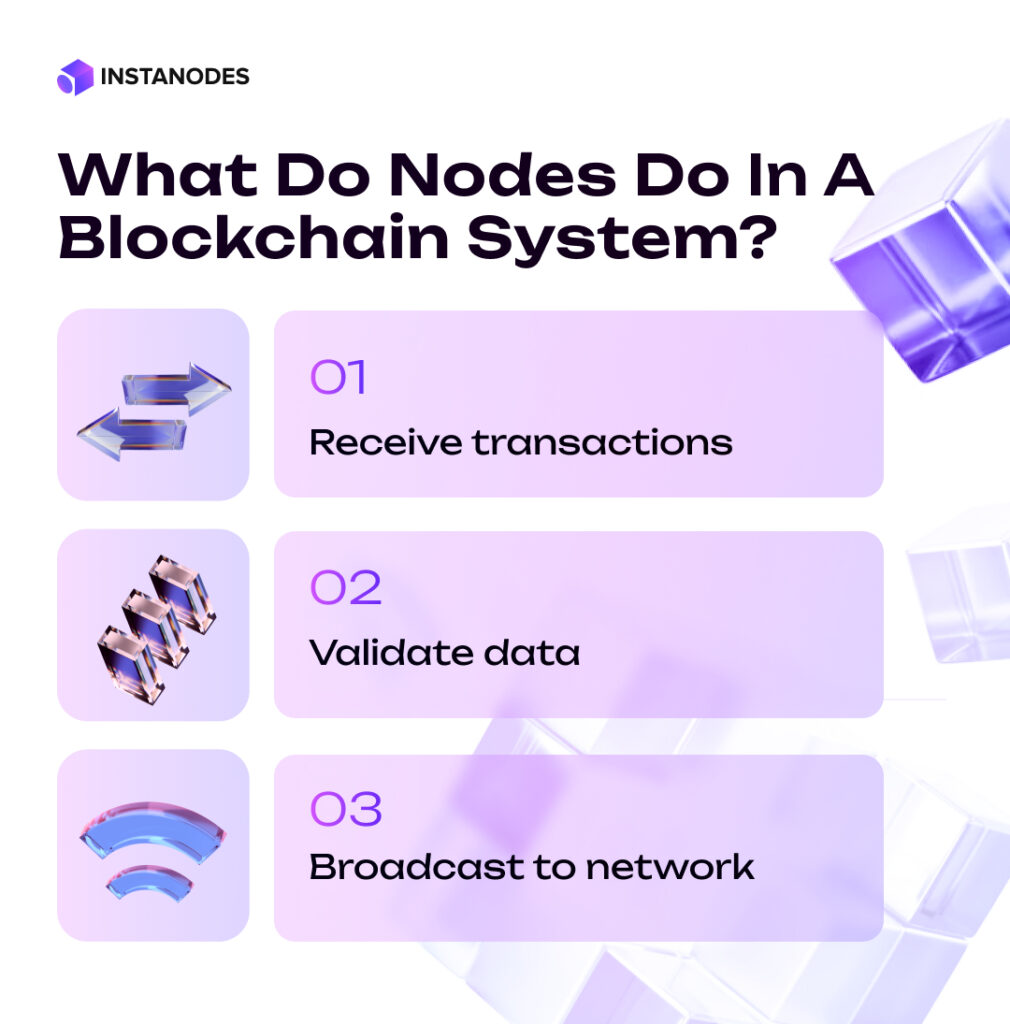
Understanding how crypto nodes operate provides insight into the sophisticated mechanisms that power blockchain networks. The process involves multiple layers of communication, validation, and consensus that work together seamlessly.
Initial Node Setup and Synchronization
- Network Joining Process: When a node joins a blockchain network, it begins downloading and synchronizing with the existing blockchain.
- Complete History Download: Initial sync requires downloading the entire transaction history from other nodes in the network.
- Storage Requirements: Bitcoin nodes need over 500GB of data, while Ethereum requires even more storage space for full synchronization.
- Continuous Updates: Once synchronized, nodes continuously receive updates about new transactions and blocks from network peers.
Transaction Reception and Processing
- Peer-to-Peer Broadcasting: Users broadcast new transactions to the network, which nodes receive through P2P communication protocols.
- Independent Validation: Each node independently validates incoming transactions without relying on other nodes’ decisions.
- Multi-Layer Verification: Nodes check digital signatures, verify sender balances, and ensure transactions follow network rules.
- Invalid Transaction Rejection: Transactions that fail validation are rejected and not forwarded to other network nodes.
Memory Pool Management
- Transaction Collection: Valid transactions are collected into a memory pool (mempool) where they await inclusion in blocks.
- Priority Ordering: Transactions in the mempool are typically ordered by fee amount or other network-specific criteria.
- Block Preparation: Mining or validator nodes select transactions from the mempool to include in new blocks.
- Queue Management: Mempools help manage transaction flow during periods of high network activity.
Consensus Mechanisms
Proof-of-Work Networks
- Mining Competition: Mining nodes compete to solve cryptographic puzzles to create new blocks.
- Block Broadcasting: Winning miners broadcast their completed blocks to the entire network.
- Network Validation: Other nodes validate the new block before adding it to their local blockchain copies.
- Chain Extension: Successfully validated blocks extend the blockchain for all network participants.
Proof-of-Stake Networks
- Validator Selection: Validator nodes are chosen to propose blocks based on their stake in the network.
- Economic Incentives: Validators must put up collateral that can be slashed for malicious behavior.
- Block Proposal: Selected validators create and broadcast new blocks according to network protocols.
- Stake-Based Security: Economic penalties ensure that validators act honestly to protect their investments.
Network Consensus Achievement
- Conflict Resolution: When nodes receive conflicting information, they follow predetermined rules to determine correctness.
- Longest Chain Rule: Most networks accept the longest valid chain as the authoritative blockchain version.
- Fork Resolution: Temporary blockchain forks are resolved when nodes converge on the accepted chain.
- Protocol-Specific Rules: Different blockchain networks implement varying consensus rules and validation criteria.
Peer-to-Peer Communication
- Gossip Protocol Implementation: Crypto nodes share information with peers, who forward it to their peers for network-wide distribution.
- Rapid Information Spread: This approach ensures information propagates throughout the network quickly without central coordination.
- Redundant Connections: Nodes maintain connections with multiple peers to ensure redundancy and prevent network partitioning.
- Network Resilience: Distributed communication prevents single points of failure in information dissemination.
Setting Up a Node: Challenges for Businesses and Developers
While running your own crypto node offers maximum control and direct blockchain access, the setup process presents significant challenges that many businesses and developers find overwhelming. These obstacles often drive organizations toward managed node services rather than self-hosting solutions.
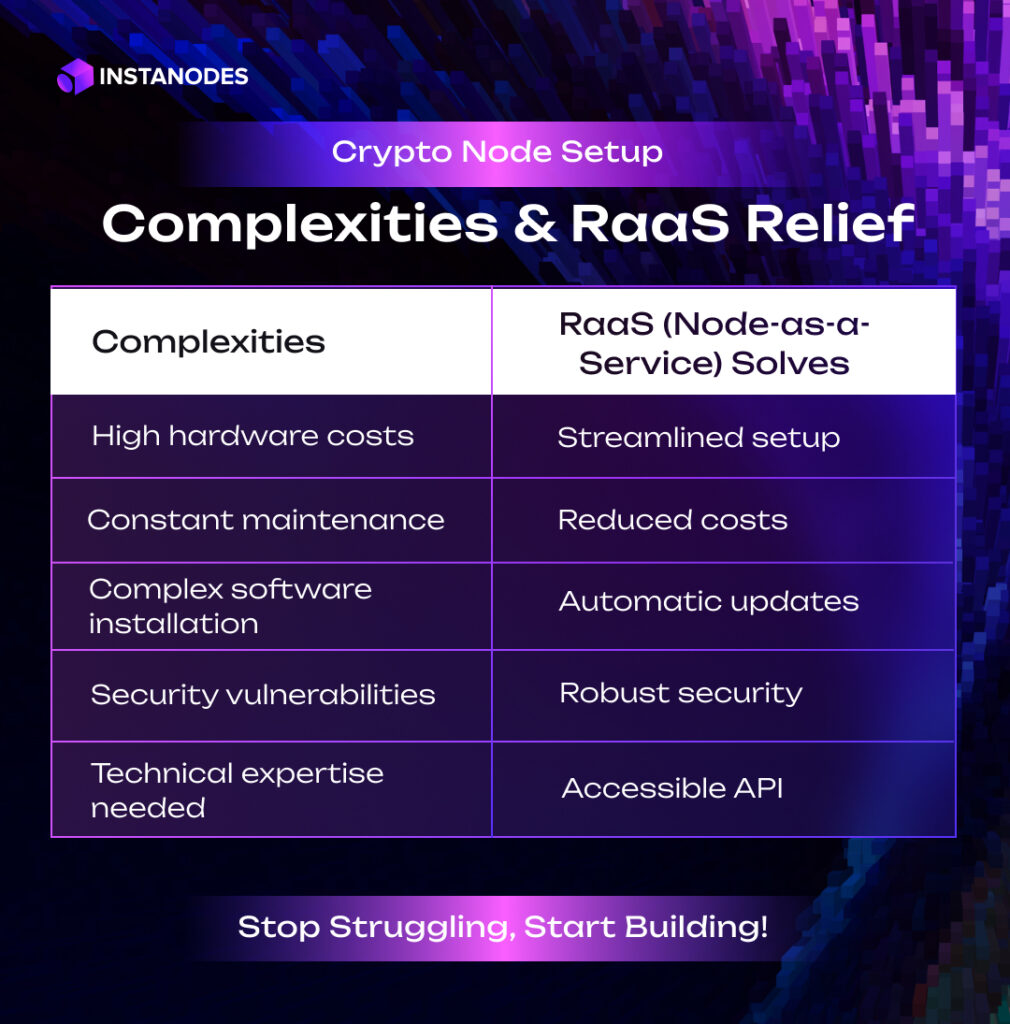
Technical Complexity Barriers
- Deep Protocol Understanding: Requires comprehensive knowledge of blockchain protocols, network configuration, and server administration.
- Security Best Practices: Demands expertise in implementing robust security measures and vulnerability management.
- Complex Installation Procedures: Each blockchain network has unique setup requirements with detailed configuration steps.
- Network Configuration Challenges: Involves managing firewalls, SSL certificates, port forwarding, and connectivity troubleshooting.
- Multi-Blockchain Learning Curve: Supporting multiple cryptocurrencies multiplies technical requirements and complexity.
Hardware and Infrastructure Requirements
- Substantial Storage Needs: Bitcoin full nodes require hundreds of gigabytes with continuous growth as new blocks are added.
- High Storage Demands: Ethereum nodes need even more resources, with archive nodes requiring several terabytes of storage.
- Processing Power Requirements: Nodes need sufficient RAM and CPU resources to handle network validation demands.
- High-Speed Internet Necessity: Reliable, fast internet connections are essential to keep up with network synchronization.
- Significant Upfront Costs: Hardware requirements translate into substantial initial investments and ongoing operational expenses.
Maintenance and Operational Overhead
- Regular Software Updates: Blockchain software requires frequent updates to maintain network compatibility and security patches.
- Continuous Monitoring: Nodes must be monitored 24/7 to ensure they remain synchronized with the network.
- Immediate Issue Resolution: Problems often require urgent attention to prevent service disruptions and data inconsistencies.
- Dedicated Technical Resources: Ongoing maintenance demands specialized personnel that many organizations lack internally.
- Performance Optimization: Regular tuning and optimization are required to maintain optimal node performance.
Synchronization and Deployment Challenges
- Extended Synchronization Time: New nodes must download the entire blockchain history, which can take days or weeks.
- Network-Dependent Delays: Synchronization time varies based on blockchain size and available internet connection speed.
- Service Unavailability: During synchronization, nodes cannot provide reliable service, creating deployment delays.
- Time-Sensitive Project Impact: Synchronization delays can significantly impact project timelines and launch schedules.
- Resource Intensive Process: Initial sync consumes significant bandwidth and system resources.
24/7 Blockchain Access Through Managed Nodes
Power your blockchain operations with enterprise-grade nodes and zero maintenance hassles.
Security Implementation Challenges
- Attractive Attack Targets: Self-hosted nodes become prime targets for attackers seeking cryptocurrency theft or network disruption.
- Comprehensive Security Measures: Organizations must implement firewalls, intrusion detection systems, and access controls.
- Regular Security Updates: Requires ongoing security patch management and vulnerability assessments.
- Backup and Recovery Planning: Need for robust backup strategies and disaster recovery procedures.
- Expertise Gap: Security requirements often exceed development teams’ infrastructure security knowledge.
Scalability and Growth Challenges
- Single Node Limitations: Individual nodes may handle development workloads but struggle with production demands.
- Multiple Node Coordination: Production applications often require multiple nodes for redundancy and load distribution.
- Capacity Planning Difficulties: Predicting and planning for future resource needs becomes increasingly complex.
- Infrastructure Multiplication: Managing multiple nodes multiplies all previous challenges while adding coordination complexity.
Cost Management Difficulties
- Variable Infrastructure Costs: Hardware, bandwidth, electricity, and maintenance costs fluctuate unpredictably.
- Hidden Operational Expenses: Many costs are not apparent until deployment, including support and troubleshooting time.
- Budget Overruns: The Total cost of ownership frequently exceeds initial budget projections.
- Multi-Network Cost Multiplication: Running nodes for multiple blockchain networks significantly increases all cost categories.
- Resource Allocation Challenges: Balancing performance requirements with cost constraints becomes increasingly difficult at scale.
Node as a Service Crypto Solutions: Eliminating Infrastructure Complexity
Crypto Node as a Service solutions have come to resolve the self-hosting hassles of blockchain infrastructure. These services offer managed node access that removes technical complexity but provides enterprise-grade reliability and performance.
Infrastructure Management Elimination
- Zero Hardware Procurement: Eliminates the need for organizations to purchase, configure, and maintain physical servers.
- No Software Installation: Removes complex blockchain software installation and configuration requirements.
- Automated Maintenance: Professional providers handle all ongoing maintenance, updates, and system optimization.
- Focus on Core Development: Development teams can concentrate on building applications rather than managing infrastructure.
- Reduced Technical Overhead: Eliminates the need for specialized blockchain infrastructure expertise within organizations.
Instant Deployment Advantages
- Immediate Node Access: Provides instant access to fully synchronized nodes through simple API calls.
- No Synchronization Delays: Eliminates days or weeks of waiting for initial blockchain synchronization.
- Rapid Development Cycles: Enables faster development iterations without infrastructure setup bottlenecks.
- Quicker Time-to-Market: Accelerates product launches by removing infrastructure deployment delays.
- On-Demand Provisioning: New nodes can be provisioned instantly as project requirements change.
Enterprise-Grade Reliability
- Redundant Infrastructure: Professional providers implement multiple layers of redundancy for maximum uptime.
- Automated Monitoring Systems: 24/7 monitoring with automated alerts and issue resolution.
- Professional Support Teams: Dedicated technical support is available around the clock.
- Service Level Agreements: Guaranteed uptime and performance commitments with contractual backing.
- Disaster Recovery Planning: Comprehensive backup and recovery procedures to prevent data loss.
Effortless Scalability
- Automatic Load Balancing: Traffic is automatically distributed across multiple nodes for optimal performance.
- Elastic Resource Provisioning: Additional resources can be allocated instantly as demand increases.
- Traffic Spike Handling: Infrastructure automatically scales to handle sudden increases in usage.
- No Capacity Planning: Eliminates the need to predict and plan for future resource requirements.
- Seamless Growth: Applications can scale from development to enterprise-level production without infrastructure changes.
Cost Predictability Benefits
- Transparent Pricing Models: Clear, predictable pricing structures without hidden infrastructure costs.
- Elimination of Variable Expenses: No unexpected costs from hardware failures, maintenance, or scaling requirements.
- Budget Accuracy: Organizations can accurately forecast blockchain infrastructure expenses.
- No Capital Expenditure: Converts large upfront hardware investments into manageable operational expenses.
- Cost Optimization: Professional providers optimize infrastructure costs through economies of scale.
Professional Security Implementation
- Specialized Security Teams: Dedicated security professionals with expertise in blockchain infrastructure protection.
- Enterprise-Grade Protection: Implementation of advanced security measures, including DDoS protection and intrusion detection.
- Secure API Access: Professional authentication and authorization systems for safe node access.
- Regular Security Updates: Automatic application of security patches and vulnerability fixes.
- Compliance Standards: Adherence to industry security standards and regulatory requirements.
Multi-Blockchain Support
- Unified API Access: Single interface for accessing multiple cryptocurrency networks and protocols.
- Consistent Development Experience: Standardized APIs reduce learning curves for different blockchain networks.
- Simplified Multi-Chain Applications: Easier development of applications that interact with various blockchain protocols.
- Reduced Integration Complexity: Single provider relationship for multiple blockchain infrastructure needs.
- Cross-Chain Functionality: Enables the development of applications that span multiple blockchain ecosystems.
24/7 Blockchain Access Through Managed Nodes
Empower your team with always-on blockchain access using managed nodes.
Types of Crypto Nodes Offered by Instanodes
Instanodes provides three distinct node service tiers designed to meet different organizational needs and performance requirements. Each option offers unique advantages depending on application requirements, budget constraints, and performance expectations.
Dedicated Nodes – Premium Performance Tier
Key Features
- Exclusive Hardware Access: Complete isolation with dedicated CPU, RAM, and storage resources for maximum performance.
- Guaranteed Performance Levels: Consistent performance regardless of other network activity or user demands.
- Complete Resource Separation: Highest level of security through total isolation from other users.
- Custom Configuration Options: Crypto nodes can be customized to meet specific performance and compliance requirements.
Ideal Use Cases
- High-Volume Applications: Perfect for applications processing large numbers of transactions.
- Enterprise Deployments: Suitable for mission-critical business applications requiring guaranteed uptime.
- Performance-Critical Systems: Applications demanding low latency and high throughput capabilities.
- Compliance Requirements: Organizations with specific regulatory or security compliance needs.
Target Organizations
- Financial Institutions: Banks and financial services require maximum security and performance.
- Trading Platforms: High-frequency trading applications need ultra-low latency.
- Large-Scale DeFi Applications: Decentralized finance platforms handling significant transaction volumes.
- Enterprise Blockchain Solutions: Corporate applications with strict performance requirements.
Shared Nodes – Cost-Effective Solution
Key Features
- Resource Pooling: Efficiently shared resources among multiple users while maintaining performance.
- Competitive Pricing: Most affordable option for accessing professional-grade node infrastructure.
- Maintained Isolation: Request isolation ensures security between different clients despite shared resources.
- High Availability Standards: Professional uptime and reliability standards for production use.
Ideal Use Cases
- Development Environments: Perfect for testing and development phases of blockchain applications.
- Small to Medium Applications: Suitable for applications with moderate transaction volumes.
- Cost-Conscious Organizations: Ideal for startups and smaller companies managing tight budgets.
- Proof-of-Concept Projects: Excellent for validating blockchain concepts before scaling.
Target Organizations
- Individual Developers: Solo developers building blockchain applications on limited budgets.
- Startup Companies: Early-stage companies requiring professional infrastructure at affordable prices.
- Educational Institutions: Schools and universities teaching blockchain development.
- Small Development Teams: Compact teams focusing on application logic rather than infrastructure.
Semi-Dedicated Nodes – Balanced Performance
Key Features
- Limited Resource Sharing: Dedicated resources are shared among only a small number of users.
- Predictable Performance: More consistent performance than shared nodes, with better cost efficiency than dedicated.
- Specific Resource Quotas: Each user receives guaranteed resource allocations for reliable performance.
- Cost-Performance Balance: Optimal middle ground between affordability and performance.
Ideal Use Cases
- Growing Applications: Perfect for applications that have outgrown shared resources but don’t need full dedication.
- Production Applications: Suitable for live applications requiring consistent performance with cost considerations.
- Scaling Organizations: Companies transitioning from development to production environments.
- Moderate Traffic Applications: Applications with steady but manageable transaction volumes.
Target Organizations
- Growing Startups: Companies expanding their blockchain applications beyond initial development.
- Mid-Size Businesses: Organizations requiring reliable performance without enterprise-level costs.
- Development Agencies: Blockchain development firms serving multiple clients.
- SaaS Providers: Software-as-a-service companies integrating blockchain functionality.
Universal Features Across All Tiers
Core Service Inclusions
- Automated Monitoring: Continuous system monitoring and health checks across all node types.
- Regular Backups: Automated backup procedures to ensure data protection and recovery capabilities.
- Security Updates: Automatic application of security patches and blockchain software updates.
- Technical Support: A Professional technical support team is available for troubleshooting and guidance.
- API Access: Standardized API interfaces for easy integration with applications and services.
Performance Guarantees
- High Uptime Standards: Service level agreements ensuring maximum availability across all tiers.
- Network Synchronization: Nodes are maintained in perfect sync with blockchain networks.
- Load Balancing: Intelligent traffic distribution for optimal performance.
- Scalability Options: Ability to upgrade between tiers as requirements change.
Comparing Self-Hosting vs. Managed Node Services
| Comparing Self-Hosting vs. Managed Node Services | ||
| Feature | Self-Hosting | Managed Node Service (Instanodes) |
| Setup Time | Days to weeks | Instant |
| Technical Expertise | High | Low |
| Cost | High CAPEX and OPEX | Predictable, scalable pricing |
| Maintenance | Requires an in-house team | Fully managed by professionals |
| Security | Dependent on internal policies | Industry-grade security protocols |
| Scalability | Limited by internal infrastructure | Instantly scalable |
| Uptime Guarantee | Not guaranteed | SLA-backed uptime |
| Support | Internal resources | 24/7 technical support from Instanodes |
Wrap Up
Crypto nodes are the essential part of the blockchain world, as they play an imminent role in maintaining transaction flow and keeping the distributed ledger system updated. They also simply smart contract deployments and decentralized app interactions. You simply cannot overemphasize their significance in the current growing blockchain environment.
Establishing and running blockchain nodes is a genuine challenge for most businesses. With hardware needs, software sophistication, regular upkeep, and security worries, self-hosted nodes require serious technical competence and operational investment. This facility tends to divert precious time and focus away from business key goals and product development.
Crypto Node as a Service providers have become game-changers that do away with infrastructure hassles while offering enterprise-class reliability and performance. Node as a Service crypto solutions are meant for tackling the technical intricacies of node management, enabling enterprises to access blockchain networks instantly and concentrate on developing innovative applications rather than dealing with the underlying infrastructure.
We at Instanodes provide dedicated, shared, or semi-dedicated node hosting, based on your requirements, which includes performance levels, cost, scalability needs, and the level of control. You can choose between these alternatives and start exploring new possibilities in the cryptosphere.
Ready to simplify their blockchain infrastructure and mitigate node management complexity? Get in touch with Instanodes, as we ensure enterprise-class reliability, customized service plans, and dedicated support. Come, let’s get started!

